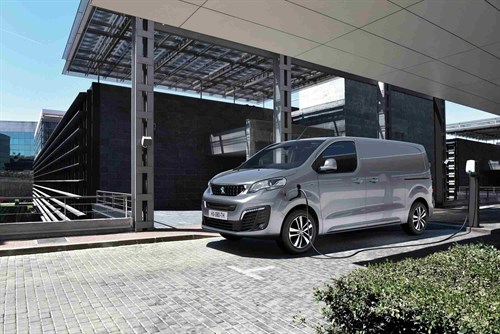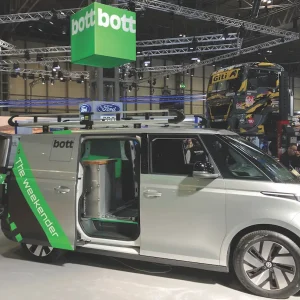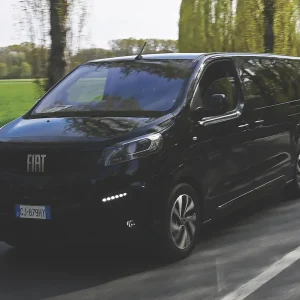The Peugeot Partner’s capture of the What Van? Light Van of the Year Award for 2020, alongside its PSA stablemates the Citroen Berlingo and Vauxhall Combo, as well as the Toyota Proace City, which is the latest model to join the platform, ensured the van continued to surf the wave of critical acclaim that began when it scooped the International Van of the Year 2019 prize followed by What Van?’s Light Commercial Vehicle of the Year Award for 2019.
The Partner is now firmly established as one of the leading lights in its sector, and Matt Weston, Peugeot’s head of business sales, when contemplating the van’s continuing success, admits: “The What Van? award has no doubt played a part in this.”
Weston stepped into the role in September last year, replacing Louise Nielson, who moved to a different position within the PSA Group. He had spent the previous three years as LCV product manager for Peugeot and Citroen.
The Partner ended 2019 as the UK’s second biggest-selling light van behind Ford’s Transit Connect, but its total of 14,605 registrations (according to the Society of Motor Manufacturers and Traders) was actually marginally down on the previous year’s haul of 15,056.
Fewer than 2,000 sales separated the trio of PSA Group light vans last year and the Partner may have lost some business to the Combo, as customers returned to the Vauxhall brand in droves after the previous-generation model (a rebadged Fiat Professional Doblo Cargo) had lost ground. Overall, Peugeot sold 32,660 vans in the UK last year, a dip of less than 2% on 2018.
With the PSA Group so entrenched in platform sharing, buyers’ choices will inevitably be influenced by which brands nurture the closest customer relationships.
Weston stresses: “Customer service is fundamental to everything Peugeot does and is always our number one priority.
“There are many elements to ensuring Peugeot is the brand of choice for any prospective customer. This includes vehicle availability, provision of aftersales facilities, and a retailer network that can assist with the sometimes complex details surrounding fleet and business commercial vehicle requirements to offer a complete solution, rather than one selling point.”
He adds: “Platform sharing enables development of new technologies and vehicles to be undertaken whilst retaining competitiveness through shared costs.”
However, he does point out: “Peugeot retains USPs such as iCockpit and Peugeot Connect SOS and Assistance as differentiators alongside differing customer profiles and strategic retailer network locations.”
Traditionally, Peugeot has tended to perform particularly strongly in the large fleet sector – witness the number of Partners beetling about in Royal Mail livery – while its longest-standing PSA sibling, Citroen, has focused more on smaller businesses.
Weston says: “Peugeot continues to perform extremely well in the fleet arena,” but claims the brand “is experiencing continued, sustained growth in the SME marketplace”.
He adds that the BlueHDi 100hp Professional trim, standard length version of the light van remains the most popular variant but says the new Grip (with added traction control for construction businesses, for example) and Asphalt (designed for long-distance delivery work) versions are gaining in popularity.
At the start of this year Peugeot added a crew van to the Partner line-up based on the long-length version with the Professional trim level. It adds a second row of three seats, with a sliding and folding mesh bulkhead containing a through-loading hatch.
With the rear seats in place, there’s a maximum load floor length of 1,450mm and a load volume of 1.8m3, while with the rear seats folded the figures rise to 2,000mm and 3.5m3 respectively. With the front passenger seat also folded, and the through-loading hatch open, up to 3,050mm of load floor length is available, and load volume is extended to 4.0m3. The maximum payload is 850kg.
The crew van is available with three of the engines offered in the panel van – a 110hp petrol, a 100hp diesel and a 130hp diesel, but not with the lower-powered 70hp unit. It is priced from £21,140, excluding VAT.
Weston acknowledges that alternative fuels are driving growth in the LCV sector even if they represent only a small proportion of sales: “We are finding that an ever-increasing number of both small and large fleets are choosing the Puretech petrol engine versions.”

Matt Weston stepped into the role of head of business sales in September

Peugeot will launch an e-Expert medium van In the second half of 2020
(Continued from page 1) The Partner benefits from innovations such as an onboard weighing system and surround-vision camera, and Weston says these, as well as other new features, have proven to be attractive to customers.
“Many of the 19 advanced driver aids have attracted new customers as users appreciate the benefits and total cost of ownership reductions that innovations can offer,” he explains.
“We’ve also found a significant number of existing customers have chosen many of these innovations to ensure they are offering the ultimate in driver comfort and safety.”
Peugeot has committed to providing an EV of all of its cars and vans by 2023 and in the second half of 2020 will launch an e-Expert medium van to join its Partner Electric and e-Boxer large van, which it revealed at last year’s CV Show.
Weston believes plug-in vans are now becoming a more realistic proposition for operators.
“As alternative-fuel technology improves and range capacity increases, these versions become increasingly viable for many operators,” he argues.
“Incentives, whether national or local, such as free parking, congestion zone exemption, and free charging are making operators seriously consider the benefits and reduced total cost of ownership that plug-in vehicles can offer.”
Peugeot works in partnership with Pod Point to help meet its customers’ charging requirements.
The e-Expert will come with a choice of two battery options, with a capacity of 50kWh or 75kWh, offering a driving range on the WLTP test cycle of 124 miles or 186 miles respectively.
Peugeot says the loadspace volume of the e-Expert will be identical to that of diesel-powered Experts.
Already available is the flagship Expert Sport Edition, which went on sale in January. Offered as a panel van and crew van, prices range from £29,460 to £35,880, excluding VAT.
The Sport Edition, which is based on the standard-wheelbase Expert, comes with 17in alloy wheels, sports decals on the sides and rear of the van, and dual-zone automatic air-conditioning.
The first models to reach showrooms were the panel van Sport Edition BlueHDi 120 S&S six-speed manual 1400 and the crew van Sport Edition BlueHDi 150 S&S six-speed manual 1400.
Two additional models will join the line-up later: the panel van Sport Edition BlueHDi 180 S&S EAT8 Auto 1200 and the crew van Sport Edition BlueHDi 180 S&S EAT8 Auto 1200.
Both models get the most powerful version of the 2.0-litre Euro6.2 BlueHDi turbodiesel engine, producing 174hp at 3,750rpm and 400Nm of torque at 2,000rpm.
The Expert and Citroen’s equivalent model, the Dispatch, are now being built alongside the Vauxhall Vivaro at Vauxhall’s plant in Luton, as well as in Sevelnord, France.
Conversions play a vital part in van manufacturers’ operations and Peugeot has moved to ensure each of its 50-plus Business Centres features examples from its Built for Business range. Coupled with a strong product line-up and a renewed focus on SMEs through its LCV Genius initiative, Weston is convinced the brand is moving in the right direction.






